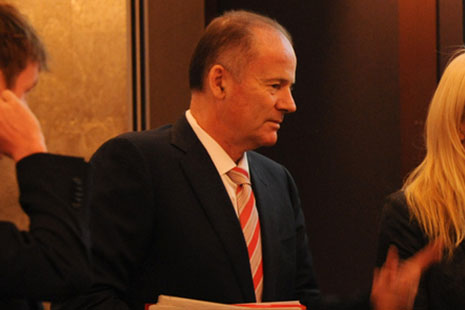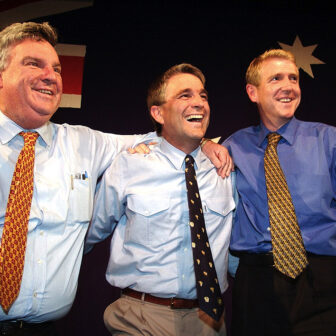FEDERAL finance minister Lindsay Tanner is not a team player. We saw this on ABC1’s Q&A last week when he flagrantly and selfishly ignored the Kevin Rudd communication rulebook.
The Rudd manual has been in operation since day one of this government and is exactingly enforced on all members. It decrees that ministers, when speaking in public, and particularly when answering a question, shall only employ generalities and clichés. They may waffle, boast of the government’s bravery, deplore the opposition’s negativity, even discuss the weather, but they must not go into policy detail.
Treasurer Wayne Swan is a walking distillation of these laws and didn’t need to be told twice. The same seems to be true of climate change minister Penny Wong; doing scores of interviews on the government’s emissions trading scheme without once trying to explain how it would work takes amazing discipline. And despite the current hoopla surrounding deputy PM Julia Gillard, for all her undoubted attributes and talents she has never really bothered telling voters much either.
But Tanner did the unthinkable: he had a red hot go at defending the government’s position on two issues currently worrying the public – the super profits tax and government debt. He did it in some detail and, with energy, passion and the authority that comes with being in government, he made shadow treasurer Joe Hockey look out of his depth.
We should be wary of reflecting on “golden years.” The Hawke–Keating governments (especially the Hawke bits) were at the time accused of being overly cautious and hostage to backroom spivs. “Pragmatism” was the dirty word of the day. But with hindsight it involved a struggle between the political straitjacket and a group of powerful personalities interested in changing the country. Today only the straitjacket remains.
When they took government in November 2007, Team Rudd’s strategy remained the same as before: get through interviews without generating headlines; run a mile from anything contentious. Always deflect. That’s the small target strategy – great for getting elected from opposition but no way to run a country. It leaves a vacuum.
Rudd’s astounding political insecurity and urge to control are surely to blame. These all but paralysed his government even when their popularity was at record levels, and now the plentiful times are gone they find they didn’t invest in political capital for the future.
This approach also represents the logical outcome of an increasing reliance on political machines. Gough Whitlam’s 1972 election was seen as a triumph of professionalism, and the next Labor government took it a step further. But today’s insecure politicians have succumbed fully to the research-generated list of dos and don’ts: keep it simple, mate, and stay on message; swinging voters are turned off by complexity. Don’t appear like you’re up yourself. Use phrases our polling shows the punters are using.
But in the real world people expect those in authority to behave like they know what they’re doing. It is not meant to be an equal relationship, and voters need to be respectfully disagreed with on occasion. As in any prospective friendship, repeating someone’s words back at them doesn’t generate a connection. Something more is required.
In earlier times, not greatly engaged voters who momentarily tuned in to an interview with treasurers Keating, Dawkins, Willis or Costello might have seen someone they didn’t much like, talking about things they didn’t much understand. But they would form the impression that this was a serious person in an important job who knew what he was talking about.
Swan, by contrast, is so determined to keep it simple he sometimes comes across as a simpleton. This tells the electorate that the job of treasurer is a doddle, or that he’s not up to it. Either conclusion makes it easier to vote for the opposition.
This is a strange time for the election watcher. There’s a conflict between the head and, for want of a better word, the heart. The heart reacts to what’s happening now, and from this vantage point the Rudd government is in big trouble and may have discovered the secret to one-term government. It is there in the prime minister’s eternal and seemingly inescapable emptiness, the enforced paralysis that sees his cabinet incapable, as Senator Xenophon put it this week, of selling heaters to Eskimos. And, most of all, it’s in the opinion polls.
But the head is made of sterner stuff. It knows that first-term governments are difficult to turf out. In fact, with many of the risk-averse voters who stayed with Howard in 2007 likely to stick with incumbency again in 2010, electoral gravity may pull the other way. As well, opposition leader Tony Abbott is very difficult to vote for. Even if the electorate has tired of the Rudd government, it needs to be reassured that the alternative is safe. Under Abbott this is a huge task.
The head also reckons that the government’s flaws may not matter as much as luck and timing and that a large Labor victory – larger than in 2007 – remains the most likely outcome.
The head usually gets it right. But sometimes the heart does too. •





